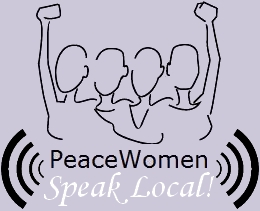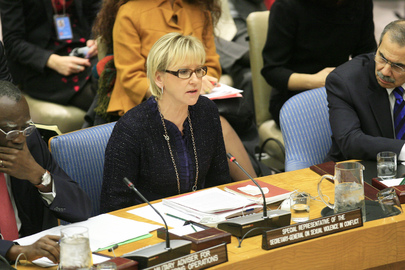An Active Agenda for Women's Advocates in 2011
This 121 edition of PeaceWomen ENews features women, peace and security news, events and resources from peacewomen.org.
The last PeaceWomen ENews focused on the subject of sexual violence against women in honor of the 16 Day Campaign and the new Security Council Resolution (1960) on sexual violence in conflict (click here for full version).
In 2011, Women's International League for Peace and Freedom (WILPF) plans to continue its tradition of carrying forward a pro-peace and women's rights agenda. Will 2011 be a year that the United Nations (and its member states) acknowledges women as equal participants in global activism for full disarmament, sustainable peace, development and human rights?
In his closing remarks on 2010, Secretary-General Ban Ki-moon elaborated plans for the UN to tackle some of the globe's biggest challenges – including climate change, poverty, and disarmament. But a widely circulated criticism of the Secretary General's op-ed asked: where are the women? In setting the 2011 UN agenda, the Secretary-General failed to promote either the gender equality of the Millennium Development Goals (MDGs) (while listing the other 7) or the political success of the creation of UN Women (despite pushing for its establishment and finding a strong leader in Michelle Bachelet). Nor did he recall the significant developments related to women in conflict and post-conflict situations, such as participation, sexual violence in conflict (also absent was mention of the horrors of the mass rapes in the Democratic Republic of Congo), or the 10th anniversary of Security Council Resolution 1325.
A Huffington Post article weighed in on the debate, asking whether UN women could reverse the United Nations' absent-minded approach to gender equality. WILPF would like to acknowledge the new UN Women agency as it begins it work identifying women's peace and security priorities and incorporating them into the UN's global agenda while emphasizing that mainstreaming gender throughout the United Nations system will require partnerships between all relevant stakeholders in civil society, national politics, and at the UN. An example of the failure to consult women and civil society organizations on the ground in conflict/post-conflict countries is highlighted in the recent letter campaign by the Global Network of Women Peacebuilders and dozens of others, calling out the Member States of the Security Council for not including women in the decision-making processes surrounding the recent sexual violence resolution -- UNSCR 1960.
In order to implement a real vision of comprehensive and inclusive local and global gender activism, WILPF members and supporters must continue to serve as a conduit between the grassroots level and national policy makers to bring women's issues and human security to transnational agendas. Organizations like WILPF must remind the Secretary-General that we cannot expect change if 50% of the global citizenry is excluded from the processes that set agendas and policies.
To support increased and effective advocacy on women, peace and security in 2011, PeaceWomen will continue to advance our monitoring and promotion of full implementation of United Nations Security Council Resolution 1325 (SCR1325) and the related resolutions (SCR1820, 1888, 1889 & 1960). As our readers know, PeaceWomen monitors the UN system and the UN Security Council, manages the translation initiative, and focuses on UN level advocacy among other projects. WILPF translates what is happening at the UN and works with sections and its membership around the world to promote the capacities, visibility, and participation of local and national women's initiatives.
In the upcoming months, WILPF aims for the Human Security Program to empower Women Peace and Security activists to ask how Member States can reorient their defense spending to pursue justice, deliver human dignity, and enable the realization of peace and development agendas. Furthermore, we aim to underline the links between the fulfillment of human rights and socio-economic security as part and parcel of an agenda that calls for the full implementation of SCR 1325, and women's full participation in particular.
While women did not make it to the center of the United Nations' new year agenda, WILPF and PeaceWomen will continue to promote building peace with gender equality and human rights. We invite advocates and believers to support PeaceWomen and join WILPF in these efforts.
Michelle Reyf is a recent graduate of Dartmouth College, where she studied International Relations and Anthropology. She has been part of the PeaceWomen team of WILPF since August 2010.
NGO Working Group on Women, Peace and Security
For January, in which Bosnia and Herzegovina has the Security Council presidency, the MAP provides recommendations on country situations such as Chad and the Central African Republic, the Democratic Republic of the Congo, Kosovo, Nepal, Sudan, and Timor-Leste.
Call for Translation of SCR 1820

Take action! The need to make women, peace and security resolutions accessible and relevant to women on the ground is more urgent than ever.
Join our "Speak Local Campaign" today. PeaceWomen needs your help to translate SCR 1820 into your language(s) to promote local ownership and women's participation in conflict prevention, protection and peace-building. Your work will be acknowledged on our site and will help raise awareness.
For more information, please click here, or email translations@peacewomen.org.
Open Debate on Sexual Violence in Conflict

On December 16th-17th, the Security Council held an open debate on "Sexual Violence in Conflict." As part of our Security Council Monitor initiative, PeaceWomen has extracted and organized the women, peace and security content of the most recent debate. The statements are available online, organized by Theme and by Country/Region.

WILPF's International Congress
Week-long conference in San Jose, Costa Rica, August 2011. WILPF members from around the globe will get together to plot, plan, and design the future of WILPF as we go towards our centenary.
WILPF's Annual Seminar
To advance the WILPF in disarmament and the prevention of conflict, WILPF organizes an annual seminar linking the topics of women and disarmament. This year, WILPF is planning a seminar on “Women, Disarmament, Arms Control and Non-proliferation”. The seminar will take place in the beginning of March 2011 in Geneva in the lead up to the 100th International Women's Day (March 8, 2011).
